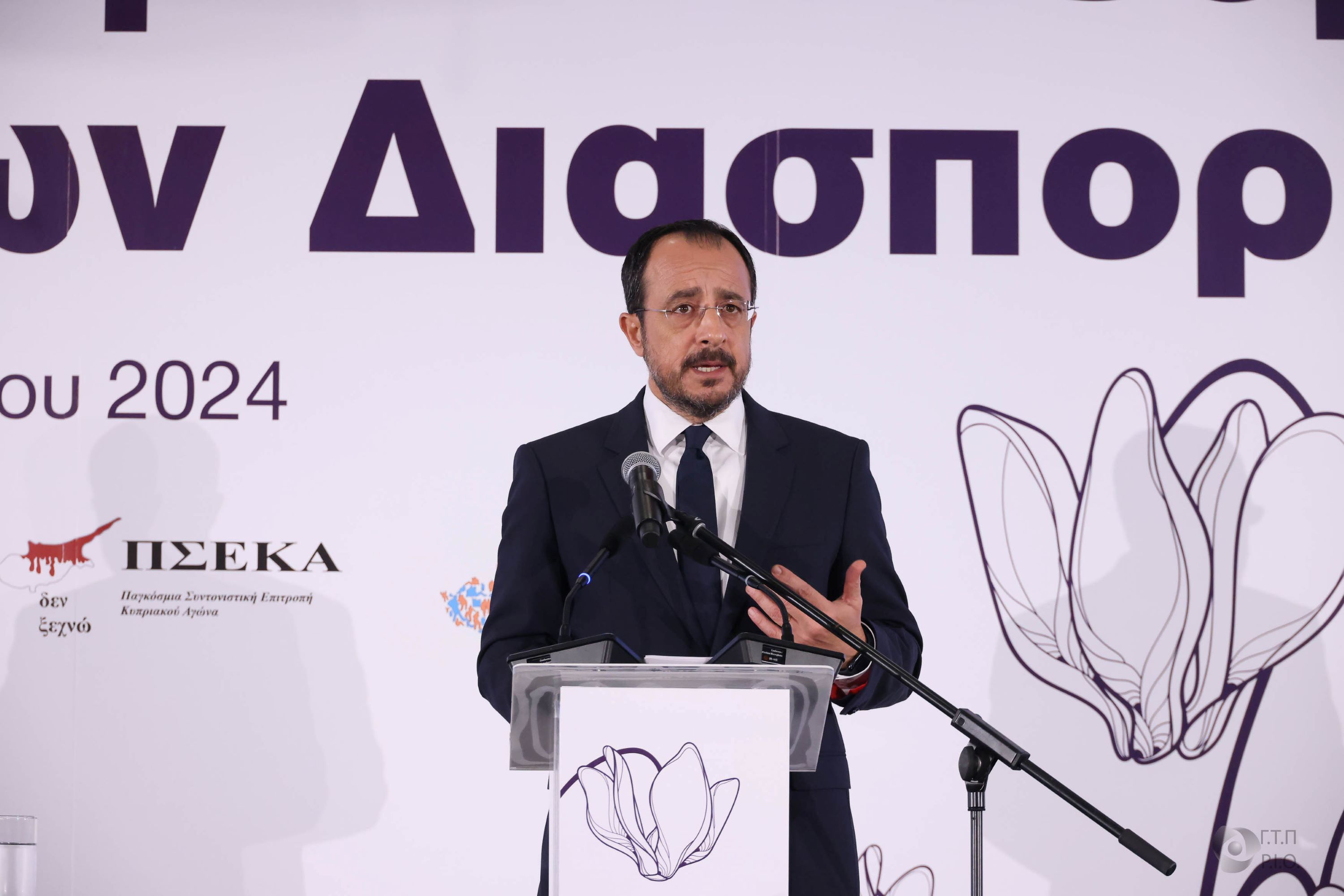The current state of affairs in the Cyprus problem is “not viable” and holds “serious dangers”, President Nikos Christodoulides said, opening the Cyprus diaspora convention.
He also said “we should not consider ourselves responsible that the Cyprus problem has not been solved, because there has been no opportunity to solve it.”
Christodoulides said one should utilise the 50 years since the Turkish invasion of the island to reflect and evaluate past approaches.
“The current state of affairs, all that we have been experiencing these 50 years, cannot constitute the future of our homeland, they cannot be the future of our children,” the president said.
He added that the main priority should be to solve the Cyprus problem and reunify the country.
Christodoulides said he would continue striving for the resumption of negotiations and supporting the UN chief in his efforts and creating a network of international support.
“We are living in an anarchic international system, international law is a powerful instrument in our efforts, but the decisions of the states are taken to serve their own interests,” he said.
Christodoulides added that “the sooner we all realise this dimension, the more successful our strategy will be to achieve the termination of the occupation and the reunification of our homeland.”
His government, the president said, “has been taking this dimension into consideration from day one.”
Christodoulides also referred to the role of Cyprus in the broader region, which “significantly strengthens our efforts” to solve the Cyprus problem.
Speakers at the opening ceremony of the convention referred to the role of the diaspora in enhancing efforts to solve the Cyprus problem and the importance of cooperation between Nicosia and Athens.
Foreign Minister Constantinos Kombos affirmed the government’s support to overseas Cypriots and referred to actions so far to facilitate their role.
He outlined a plan of action which will be discussed with the diaspora over the coming days so that it can be set in motion in 2025.
President of the World Federation of Overseas Cypriots (Pomak) Andreas Papaevripides said it was “an historical duty to deliver a free Cyprus to the next generations.”
He expressed hope that efforts to resume negotiations would be fruitful and based on UN resolutions.
President of the International Coordinating Committee – Justice for Cyprus (Pseka) Philip Christopher said efforts to solve the Cyprus problem had so far failed and no refugee had returned home.
He congratulated the government for striving to become the solution in the region and to align its interests with those of the US, the UK and the EU.
Christopher said it was high time to restore the Cyprus problem to one of an illegal invasion.
President of Pomak’s Youth (Nepomak) Christos Tuton said the struggle for a solution will continue.
Tuton said that although no Nepomak member had been born in 1974, they have still heard of the pain and ordeal of those who lived through the invasion.
Greek Deputy Minister of Foreign Affairs Giorgos Kotsiras said prolonging the status quo or establishing two states in Cyprus were not acceptable solutions, neither for Greece nor for Europe.
He pointed out that the Cyprus problem is an international matter of illegal invasion and occupation and that its solution was and remained as top national priority for Greece.
Kotsiras said that apart from their mutual views on the political front, the two countries were connected through the diaspora, the service of which to defending national interests was unquestionable.
The struggle to awaken the international community and put an end to the Cyprus problem passes through the diaspora, through the overseas Greeks and Cypriots, he said.
Kotsiras referred to the work done by the Hellenic state for the diaspora, investing in Hellenism, which would “strengthen our voice, strengthen the voice of Cyprus.”
Archbishop of Cyprus Georgios said times were crucial for the Cyprus problem, with Turkey steadfast in refusing to withdraw its troops from the island and to allow the refugees to return to their homes.
He reiterated that “the problem should be restored to its proper dimension as a problem of invasion and occupation.”
The archbishop assured that the Church of Cyprus would never accept a bad solution, which would “not guaranteed the national and religious survival of our people, but instead would place our country in danger.”







Click here to change your cookie preferences